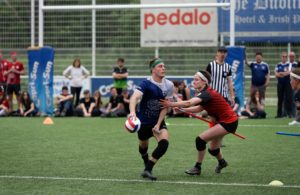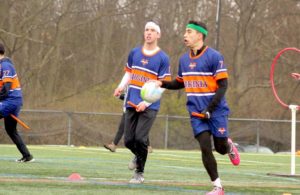- Rule, Britannia, no more?
- Unpopular Opinions: US Quadball Cup 2023
- Proven Contenders: University of Virginia
- Proven Contenders: Rutgers University
- Proven Contenders: University of Michigan
- Proven Contenders: Creighton University
- Different Perspectives: A Look Inside USA Ultimate
- Antwerp QC, Much of Belgian Core, Leaves Competitive Quidditch
Quick Takes: WRC
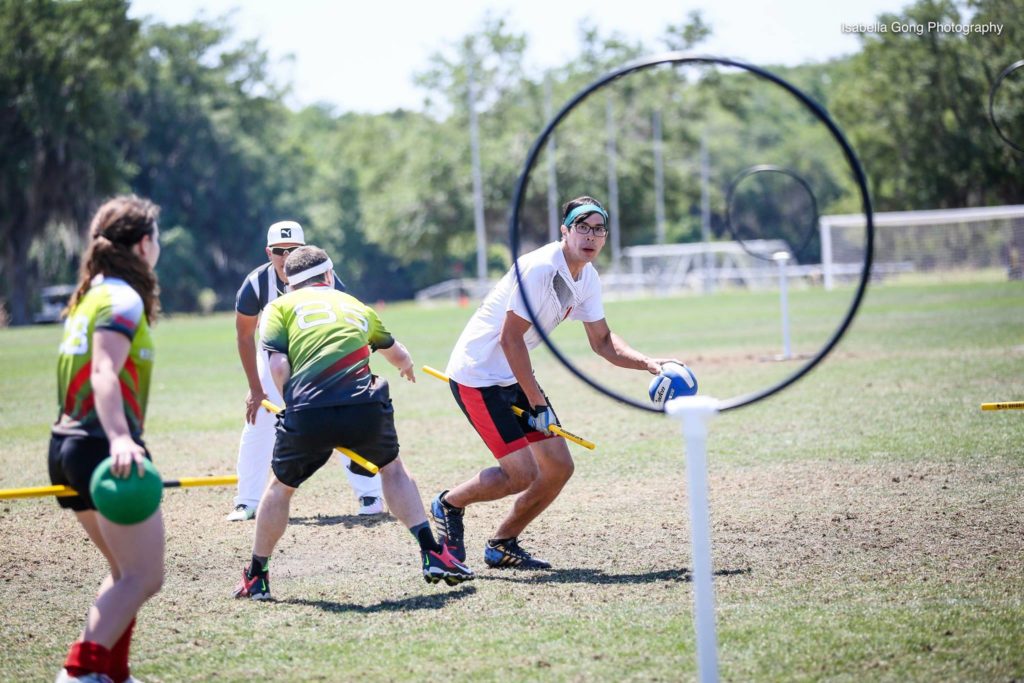
Credit: Isabella Gong
By Tyler Walker, Managing Editor
Ryan Pfenning, Rankings Contributor
The Won Boys
The top two of the three community bids feel locked in; the Los Angeles Gambits seem to be the most certain to earn a bid, but crosstown rival, the Lost Boys, could be the favorite to win the championship.
This season, Gambits have been characteristically dominant in the West. In their 13 in-region games, only three have been in-range, all of which were against the Lost Boys. The series between the Lost Boys and Gambits currently sits at 2-1 on the season in favor of the former, with the most recent matchup at the Heroes vs. Villains Invitational seeing the Lost Boys overcome the Gambits 130*-120. The first two games of the season had the exact same score of 90*-60, with the Lost Boys winning the first matchup of the season at the Golden Bear Invitational and the Gambits taking the win at the Long Beach Invitational.
The Lost Boys’ season thus far has had its setbacks and concerns, however, they should still be considered the favorite to win the club side of the West Regional Championship. While their games against the Gambits have been impressive, a majority of their season has been underwhelming. The most glaring mark is a 130*-60 loss to the Northwest’s Nomads to start the season, but the Lost Boys’s results against second- and third-tier club teams are a major cause for concern because they will certainly encounter a multitude of these at this weekend’s regional. Let’s take a look at their performance against said teams thus far: Two in-range games against the Long Beach Funky Quaffles; one against the Rain City Raptors, who struggled at the Northwest Regional Championship; and a narrow win against the Silicon Valley Skrewts where the Lost Boys finished ahead by only 40 quaffle points. These games do not instill confidence, but what should is the Lost Boys’s recent performance at Heroes vs. Villains.
Yes, they played Long Beach in-range, but they also went 4-0 in pool play and took two wins in the bracket. Although the final against the Nomads was cut short, the Lost Boys looked like the better team before the lights cut out. If the they show up with a full roster including the likes of Duran Allison, Kendrick Ushera-Surrell and Peter Lee, they should be considered the favorites to win the West.
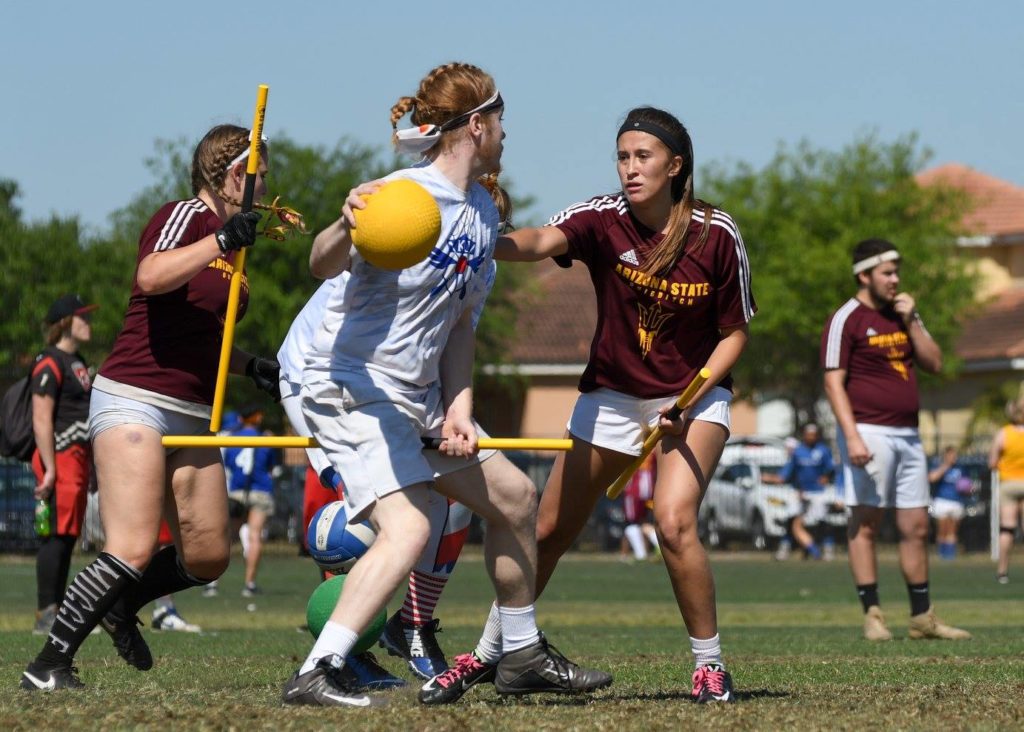
Credit: Phoebe VanGelder
A-S-Who’s Next?
Arizona State University is the clear favorite to win the collegiate regional title; the team has yet to lose a game to a collegiate opponent. The question is who will challenge them for the title?
The most likely teams to make the college finals series are either UC Berkeley (Cal) or UCLA. At Heroes vs. Villains, Cal played Arizona State in-range, but this was a game where both teams were missing key players. Arizona State sat out Caleb Ragatz, Dylan Bryant and Vicky Sanford while Cal was missing Ryan Pfenning, Michael Seraydarian and Jordan Tate. Cal, for the most part, has stayed close to home but has had a difficult schedule nonetheless. Their 4-8 record seems underwhelming for a team likely to make their regional semifinal. Of their losses, however, only one was against a college opponent. This will be the first tournament of the year that Cal brings a full-strength lineup, so we’ll see what they can really do.
No team in USQ enters the West Regional Collegiate Championship with higher potential than UCLA, and the team currently has the most games played by a college team this season. One of those was an overtime loss to Cal 180^-140* at the beginning of the season. Losing 17 seniors last season would cripple most teams, yet UCLA has not only succeeded but rather they’ve excelled against stiff competition. In back-to-back weeks in January, the Bruins travelled to New Orleans for Wolf Pack Classic and finished in the semifinals then went 2-2 at Heroes vs. Villains in the Heroes pool with notable wins over Twin Cities Quidditch Club and Long Beach.
Who Gets the Third?
While the first two club spots seem to be locked, the third club regional bid could fall to one of five teams.
Crimson Elite enters the weekend as the highest-ranked of those five. Their record of 11-6 seems impressive, but six of those wins were against Utah collegiate teams University of Utah and Utah State University.
Long Beach is one of the lower-ranked teams in the club division but performed well at Heroes vs. Villains despite coming up just short of wins against the Lost Boys (120^-90), UCLA (160*-100) and Rochester United (100*-40). Long Beach definitively has the most at stake this weekend. The team’s low ranking means they are unlikely to secure an at-large bid, and will be facing an uphill battle to do so.
Currently, the Silicon Valley Skrewts and their neighbor, the Silicon Valley Vipers, sit in place to get one of the 11 at-large bids; but, a few too many losses could push them out. While the Fighting Farmers seem the most unlikely to get the final regional bid, their roster is arguably the most impressive on paper.
All of these teams will likely play their best games against one another. That said, it would be of no surprise if the third club bid to USQ Cup 11 came down to tiebreakers.
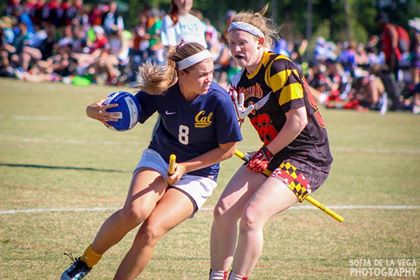
Credit: Sofia de la Vega
Players to Watch
Keepers
- Dylan Bryant (Arizona State, #2)
- Jonathan Rovetta (UCLA, #15)
- Colin Statt (Northern Arizona, #20)
- Cameron VomBaur (Utah State, #47)
- Jordan Tate (Cal, #6)
This group is highlighted by breakout keeper Jonathan Rovetta, who has rapidly developed as a reliable ball-carrying option, providing UCLA with much needed depth and size after the loss of their huge graduating class last season. Colin Statt provides a spark of athleticism for Northern Arizona while Jordan Tate brings a vastly different style and skill set to Cal’s offense. As for Dylan Bryant, if he can stay on the pitch for significant minutes in high-pace games, Arizona State will be a force to be reckoned with.
Beaters
- Ryan McGonagle/Vicky Sanford (Arizona State, #11/23)
- Elsa Lem/Anna Huang (SJSU, #72/13)
- Jon Ingram (Arizona, #79)
- Dru Smith (Utah State, #76)
- Adam Beller (Northern Arizona, #2)
Highlighting this group is Arizona State’s beater duo of McGonagle and Sanford, who are among the best beater duos in the nation and are legitimate US National Team hopefuls. SJSU’s Elsa Lem and Anna Huang are able to run the best double female beater set outside of Texas, bringing smart positioning and MLQ experience to a young roster. As Utah State and Northern Arizona battle for the final two college bids, the matchup between Dru Smith and Adam Beller will be key to watch for both teams’ success.
Chasers/Utility
- Maddi Erdall (Cal, #8)
- Elizabeth Ng (UCLA, #61)
- Christian Clarion (UCLA, #32)
- Tyler Hodges (UC Irvine [Anteater], #565)
- Kobe Kendall (Anteater, #8)
- Hugo Quiroz (SJSU, #88)
- Brandon Williams (Stanford University, #15)
- Paul Marygold (Utah State, #11)
- Makenna Baum (Arizona State, #22)
- Connor Hughes (Cal, #2)
Maddi Erdall and Elizabeth Ng stand out above the rest and are easily the two best non-male chasers in the region, providing real offensive threats other than just standing by a hoop. SJSU’s Hugo Quiroz can play almost every position at a high level and Anteater’s Kobe Kendall is a dynamic rookie who will need to come up clutch both beating and seeking for his team to have a shot at qualifying for Nationals. Stanford’s only hope of pulling out wins lies on the back of Brandon Williams and whether his teammates can feed off of his tenacity. Paul Marygold will need to make open field tackles for Utah State for them to compete with strong driving teams in their pool such as Arizona State and Northern Arizona.

